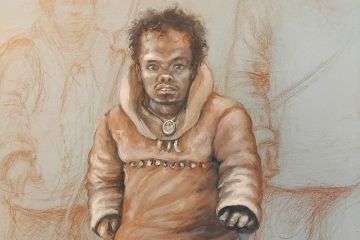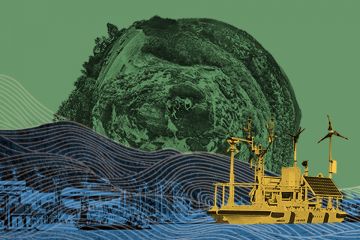JCURA: A cornucopia of undergrad research
- Patrick Craib

The Michele Pujol room in the Student Union Building was brimming with enthusiasm on April 10 as up-and-coming young scholars showcased their original research projects at the Jamie Cassels Undergraduate Research Awards Fair. Established in 2009, the JCURA program encourages the development of strong academic relationships by funding collaborative research projects between faculty and undergraduates, giving promising students an appetite for original research in the process. This year there were 99 JCURA scholars, supervised by 87 faculty members, across 41 departments and schools.
“The JCURA program is unique in Canada for the depth and breadth of disciplines involved across the full academic spectrum,” says Teresa Dawson, director of the Learning and Teaching Centre, which administers the program.
By pairing professors with students, the program provides research opportunities rarely encountered at an undergraduate level. One of the students, Danielle Chan (biochemistry and microbiology), noted that the program allowed her to continue a strong working relationship with her supervisor Dr. Robert Burke, established in a co-op work term from the previous year.
More than a few students’ projects were interdisciplinary. David Fainstein worked with Dr. Valerie Irvine (education) on effective means of digital delivery for classroom lectures. He was enthusiastic about this opportunity to draw upon his background in psychology and computer science and expand his research into the field of education, gaining valuable applied experience.
At the event’s opening ceremony, Dr. Michael Miller, associate vice-president research, remarked that, “research means nothing until you present it.” And the students presented their work in a variety of formats. Not all of students’ research was represented at the poster session. There were some lively performances and films shown, including that by writing student Caitlin Jessen, who staged a scene from her play “Carry that Weight” to an intimate audience in the upper lounge.
Interacting with older traditions in new ways, visual arts student Elyse Portal’s project drew upon local First People’s oral history, working closely with UVic Elders-In-Residence Joyce and Victor Underwood (Tsawout) and Prof. Lynda Gammon. Portal’s multi-stage “social practice” performance and participatory art project emphasized the reflective examination of people’s present and historical relationships to the land. Themes of applied art were also pursued by theatre students Randi Edmunson and Sarah Johnson in their work with Dr. Warwick Dobson, investigating ways in which theatre has been (and can be) conducted with a social purpose.
The students’ enthusiasm for their work was palpable, and students like Trystyn Berg (physics and astronomy) were eager to relate their findings. Berg’s research involved studying rare elements and star formation, and he emphasized his positive experiences with both his program and his supervisor Dr. Kim Venn, noting that the “great professors” in his department were always very encouraging.
Other students’ passion for their work was drawn from their personal experiences with their subject. Russell Claus (political science) studied occupational hazards faced by silviculture workers. His work was informed by his own time tree-planting and neatly fit with the field of expertise of his supervisor, Dr. Jamie Lawson.
Linking students in close working relationships with their professor has clearly led to some exciting first brushes with original research. If this year’s strong showing was any indication, not only will students continue to thrive under the JCURA program, but this won’t be the last we hear of these young scholars.
For more information, a list of all this year’s JCURA students and abstracts of their projects, see http://www.ltc.uvic.ca/scholarships/jcura.php
Photos
In this story
Keywords: interdisciplinary, research, undergrad
People: Teresa Dawson





